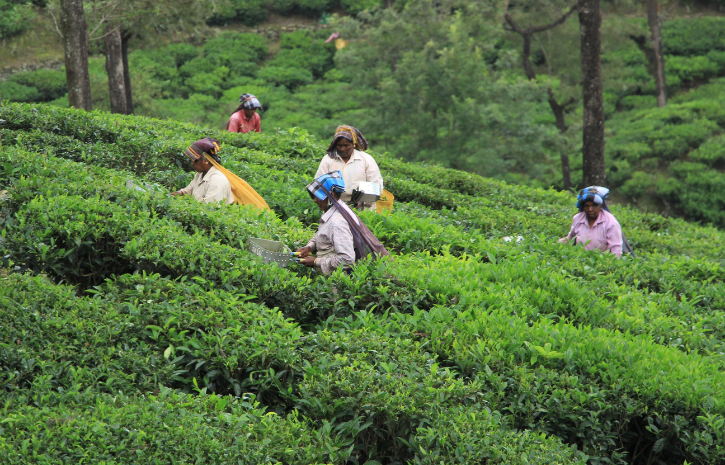Is Darjeeling Tea's Production In Crisis?

Table of Contents
The Impact of Climate Change on Darjeeling Tea Gardens
The delicate ecosystem of the Darjeeling tea gardens is highly sensitive to climate change. Unpredictable weather patterns pose a significant threat to Darjeeling tea production.
Changing Weather Patterns
- Erratic Rainfall: Inconsistent rainfall patterns, characterized by both prolonged droughts and intense downpours, disrupt the crucial stages of tea plant growth. The years 2016 and 2020, for instance, witnessed devastating floods that severely impacted tea yields.
- Rising Temperatures: Increased temperatures, exceeding optimal levels for tea cultivation, negatively affect the quality and quantity of the tea leaves. This leads to a reduction in the distinctive muscatel flavor that Darjeeling tea is prized for.
- Unexpected Frost: Unseasonal frost events can cause significant damage to the tea bushes, particularly impacting the early spring flush, which yields the most prized tea. Data suggests that frost-related losses have increased in recent decades, directly affecting Darjeeling tea production.
These changing weather patterns disrupt the delicate balance needed for optimal tea growth, impacting both yield and the characteristic flavor profile of Darjeeling tea.
Pest and Disease Outbreaks
Climate change exacerbates the problem of pest and disease outbreaks in Darjeeling tea gardens. Warmer temperatures and increased humidity create favorable conditions for the proliferation of various pests and diseases.
- Common Pests: Red spider mites, aphids, and various types of caterpillars inflict significant damage on tea plants, reducing yields and increasing the need for pesticides.
- Diseases: Blight, root rot, and other fungal diseases weaken the tea plants, making them more susceptible to pests and reducing their productivity.
- Pesticide Use and Environmental Concerns: The increased use of pesticides to combat these threats raises environmental concerns and questions about the long-term sustainability of Darjeeling tea production. The transition to organic farming practices faces significant challenges in the context of these heightened pest and disease pressures.
Challenges in Labor and Workforce
The Darjeeling tea industry also faces significant challenges related to its labor force.
Labor Shortages and Migration
Attracting and retaining workers, particularly younger generations, in the tea plantations is proving increasingly difficult.
- Reasons for Labor Shortages: Younger generations are migrating to urban areas in search of better job opportunities, higher wages, and improved living conditions. The physically demanding nature of tea plantation work and relatively low wages contribute to this exodus.
- Impact of an Aging Workforce: The aging workforce poses challenges for the long-term sustainability of Darjeeling tea production, impacting productivity and the effective transfer of traditional knowledge and expertise. Data shows a significant decline in the number of young people entering the tea industry.
Fair Wages and Worker Rights
Ensuring fair labor practices and worker rights is crucial for a sustainable Darjeeling tea industry.
- Ethical Considerations: Exploitation of workers and unfair wages impact worker morale and productivity, ultimately affecting the quality and consistency of Darjeeling tea production.
- Fair Trade Initiatives: Promoting fair trade certifications and supporting initiatives that advocate for fair wages and improved working conditions are essential steps towards ensuring a sustainable and ethical Darjeeling tea industry.
Market Competition and Economic Factors
Darjeeling tea faces fierce competition in the global market.
Global Competition
Cheaper tea from other regions, particularly from mass-producing countries, poses a significant challenge to the market share of Darjeeling tea.
- Major Competitors: Assam tea, Kenyan tea, and various Chinese teas represent significant competition, offering lower prices and higher volumes.
- Price Fluctuations: Fluctuations in global tea prices impact the profitability of Darjeeling tea farmers and producers, placing pressure on their livelihoods.
Branding and Marketing
Maintaining and enhancing the premium positioning of Darjeeling tea in the global market requires strategic branding and marketing initiatives.
- Successful Branding Strategies: Highlighting the unique flavor profile, the traditional production methods, and the geographical origin (terroir) are crucial aspects of effective branding. Obtaining certifications like Geographical Indication (GI) tags enhances brand protection and premium pricing.
- Quality Control: Maintaining consistent quality and adhering to stringent quality control standards are essential for upholding the reputation of Darjeeling tea and its premium price point.
Conclusion
The future of Darjeeling tea production faces multiple significant challenges: the impacts of climate change are undeniable, resulting in fluctuating yields and increased pest and disease outbreaks. Labor shortages and the need for fair wages further complicate the situation, while intense global competition and the necessity of strong branding strategies add to the complexity. These challenges demand immediate attention and proactive solutions. Choose ethically sourced Darjeeling tea to help preserve this iconic beverage. Support sustainable Darjeeling tea production: your choices matter. The future of Darjeeling tea production depends on our collective action. By understanding the issues and making informed choices, we can ensure the survival of this precious heritage.

Featured Posts
-
 Stepfather Faces Murder Charges In 16 Year Olds Torture Death
May 04, 2025
Stepfather Faces Murder Charges In 16 Year Olds Torture Death
May 04, 2025 -
 Yellowstone National Park Vicinity 7 Dead In Highway Crash
May 04, 2025
Yellowstone National Park Vicinity 7 Dead In Highway Crash
May 04, 2025 -
 Eurovision Song Contest Oesterreichisches Duo Fuer Deutschland
May 04, 2025
Eurovision Song Contest Oesterreichisches Duo Fuer Deutschland
May 04, 2025 -
 The Great Leslie Continues Eurovision Bid
May 04, 2025
The Great Leslie Continues Eurovision Bid
May 04, 2025 -
 Nigel Farage Press Conference What I Saw And Heard
May 04, 2025
Nigel Farage Press Conference What I Saw And Heard
May 04, 2025
Latest Posts
-
 Germanys Eurovision 2025 Heat One Viewing Figures Analyzed
May 04, 2025
Germanys Eurovision 2025 Heat One Viewing Figures Analyzed
May 04, 2025 -
 Esc 2025 Vorentscheid 1 Wie Viele Zuschauer Sahen Zu
May 04, 2025
Esc 2025 Vorentscheid 1 Wie Viele Zuschauer Sahen Zu
May 04, 2025 -
 Zuschauerzahlen Esc 2025 Vorentscheid 1 Die Einschaltquoten
May 04, 2025
Zuschauerzahlen Esc 2025 Vorentscheid 1 Die Einschaltquoten
May 04, 2025 -
 The Great Leslie Continues Eurovision Bid
May 04, 2025
The Great Leslie Continues Eurovision Bid
May 04, 2025 -
 Eurovision Song Contest 2025 Deutschlands Suche Nach Dem Sieger 7 Kandidaten Im Rennen
May 04, 2025
Eurovision Song Contest 2025 Deutschlands Suche Nach Dem Sieger 7 Kandidaten Im Rennen
May 04, 2025
